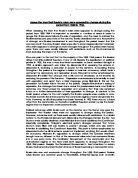Explain why the opponents of the Tsars from 1855 to 1917 were more successful than those who opposed the communist regime from 1917 to 1964.
Explain why the opponents of the Tsars from 1855 to 1917 were more successful than those who opposed the communist regime from 1917 to 1964.
Throughout the 1855-1964 period, opposition remained a constant threat to both communist and tsarist Governments. Opposition was largely unsuccessful throughout the period, only fully uniting in the February Revolution, an important turning point in the development of the Russian state that did not occur under communist. Several other factors including loyalty of the army, the varying degrees of control and terror towards the masses meant that opponents of the Tsars were more successful than those who opposed the communist regime.
The army was an integral part of the Russian state throughout the 1855-1964 period, considerable continuity can be found in how Russian rulers used the army in dealing with opponents. When there was a rebellion in Hungary in 1955, Khrushchev sent in the army to crush it, the same course of action had been taken to crush the Polish revolt in 1861. Lenin used military force against the Green armies of the peasantry in the Civil War and the army had also been heavily employed under Alexander II, with military force being deployed 185 times between 1855-60 alone. Stalin had also used brute force in forcing through his policy of collectivisation, albeit on a much grander scale.
The army was continually used by communist and tsarist Governments, however one can point out that a reason why opponents of the tsars were more successful is due to the loyalty of the army. Bloody Sunday showed that Nicholas II remained in power due to the loyalty of the army, however by 1917 it was a completely different playing field, which allowed the February Revolution to succeed. In contrast to the communist regime who were in receipt of total loyalty from the army, mutinies were commonplace in 1917, by which stage over 1 million had deserted, as well as 1905. This had forced Nicholas II’s hand in making concessions through the October Manifesto, and later abdicating. This was not the case under the communists which allowed their regimes to eliminate potential threats quick and painlessly. Opponents to the crown succeeded because Nicholas II had lost the support of the army, whereas Lenin was able to defend his revolution in the Civil War because the army remained loyal to him.







